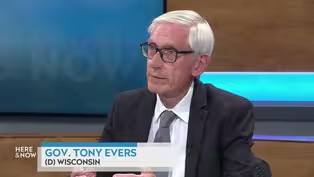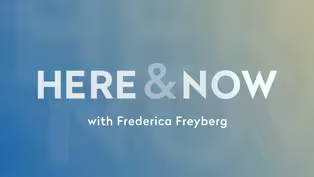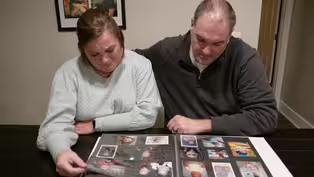Here and Now
Justice Ann Walsh Bradley on the Courts, Law and Politics
Clip: Season 2400 Episode 2401 | 9m 5sVideo has Closed Captions
Ann Walsh Bradley on serving on the Wisconsin Supreme Court for 30 years.
Former Wisconsin Supreme Court Justice Ann Walsh Bradley reflects on serving on the state's high court for 30 years and how growing influence of partisan politics has affected its work and influence.
Problems playing video? | Closed Captioning Feedback
Problems playing video? | Closed Captioning Feedback
Here and Now is a local public television program presented by PBS Wisconsin
Here and Now
Justice Ann Walsh Bradley on the Courts, Law and Politics
Clip: Season 2400 Episode 2401 | 9m 5sVideo has Closed Captions
Former Wisconsin Supreme Court Justice Ann Walsh Bradley reflects on serving on the state's high court for 30 years and how growing influence of partisan politics has affected its work and influence.
Problems playing video? | Closed Captioning Feedback
How to Watch Here and Now
Here and Now is available to stream on pbs.org and the free PBS App, available on iPhone, Apple TV, Android TV, Android smartphones, Amazon Fire TV, Amazon Fire Tablet, Roku, Samsung Smart TV, and Vizio.
Providing Support for PBS.org
Learn Moreabout PBS online sponsorship>> All right, governor Tony Evers, thanks for your time today.
>> Appreciate it.
>> The Wisconsin Supreme Court has completed its term by releasing decisions in a number of high profile cases, including A43 decision to overturn Wisconsin's 1849 abortion ban.
The end of the term also means the end of the career of chief Justice Ann Walsh.
Bradley, who decided to retire after 30 years on the High Court.
I sat down with the Chief justice recently to discuss her career and the future of the court.
Madam Chief Justice, thanks for your time.
>> Pleasure to be here.
Zach.
>> Let's go back to the start.
Can you imagine what yourself in 1995 would think of where you are today, all these years later?
>> Well, it's been a journey and the journey, of course, has been traveled by me.
But with surrounded by family and friends and colleagues.
To answer your question, I don't think I would have seen myself as I am today.
30 years ago.
That's right.
>> So Shirley Abrahamson was the first woman appointed to the Wisconsin Supreme Court.
But you were the first elected.
How far have we come in that?
It's been mostly women on the court today, and most people in the modern era.
This think of it's natural for women to sit on the bench.
>> Well, it's been we've come a long ways.
You know, that's a perhaps a worn out phrase, but it holds some truth to it.
When I got on the circuit court in Marathon County, there were only ten women judges in the entire state, and I was one of three north of Madison.
And Milwaukee.
When I became an attorney and went to Wausau, I remember that very first day being welcomed by my supervisor with this, he said, I want you to know I have no problem with a woman trying to do a man's job.
So it has been a journey from the first days of being an attorney and then being a circuit court judge.
And till now we have six of the seven members on our court are serving as women.
So that's a that's a long way.
>> So it was just a couple of years ago, the night that Janet Protasiewicz was elected to be a member of the court.
I happened to interview you, and I said, you're up next.
Have you thought about whether you want to run?
And you told me, I'm going to run and I'm going to win.
>> Yes.
>> Take us from that moment to your decision that this was going to be the end of your time on the bench.
>> It was a difficult decision.
A decision that took me many months.
I had engaged services of someone who was going to be helping me run the campaign.
But ultimately, as I reflected, I made lists of as most people or many people would do of yes, I want to run or no, I should not run.
And the it was just time to pass the torch.
I've been on the court for 30 years, I'm told I have participated in 28,000 cases.
2400 oral arguments, 600 or so opinions.
And it was time to pass the torch to begin a new chapter of my life.
I don't look at this as retirement because I have a number of things I want to do and accomplish, but it's a new chapter.
>> When you first ran for the court, there wasn't nearly the public attention, certainly not the money or even the partisan involvement.
You ran as a nonpartisan and criticize accepting endorsements from from conservative politicians.
How how do you view the elections that occur today?
Even your successor had to court the Democratic Party received millions in fundraising.
And yet has to try and claim judicial independence when she takes the robes.
How has that altered how the justices see themselves and how the public sees the court?
>> In 1995, when I ran that first race, I had as my co-chairs, Tony Earl, who was the former Democratic governor, and Sue Ann Thompson, who was the then first lady.
Her husband, Tommy Thompson, serving as my co-chairs.
I had strong bipartisan support, and I've had strong bipartisan support in all of my campaigns.
But it's harder to get this is labeled as a nonpartisan race.
It's in April, right?
That's when we have the nonpartisan elections.
And I am concerned about the influx of partisanship in judicial races.
That's of great concern to me because I think that it has a couple of effects.
Number one, it has an effect on the public trust and confidence in an independent judiciary.
And being independent not only in substance but also in impression is important for the public trust and confidence of the people.
So I think the influx of political parties and the great amount of money is of concern.
>> The legal landscape surrounding the court has changed as well.
The amount of groups that exist only to file lawsuits with the best hand-picked cases and plaintiffs involved in order to find a crack in precedent to overturn something.
How how does that change how you react from the bench when you know that this was, you know, hand-selected just in order to try and reach the opposite conclusion?
>> Your question brings to mind something my husband once said to me, because I mentioned, you know, being involved in 28,000 cases and all the oral arguments.
He said, well, hasn't it all been decided already?
You know, there are so many cases, but the answer is no.
I get thrilled by the presence of good arguments and good attorneys because they really help the court develop the law.
And when new arguments are brought up, then we take a look at the issue in the way it's framed, citing different cases and different issues.
>> Do you support change in the Constitution to eliminate elections or alter elections, or you talked about what other states do?
There's a lot of options out there.
Do you have a proposal that you would any proposal that I support, but I do support looking at all sorts of different options.
As I know, groups and legislators are doing right now because we have a challenge before us.
And the challenge is to make the selection of justices and the campaigns.
If we continue with campaigns, better not for the sake of making a campaign better, but for the sake of the 5.8 million people who call Wisconsin home, they deserve a judiciary, that they have trust and confidence in.
>> How might that have changed you becoming a member of the Supreme Court?
Because back in 1995, you may not have been either selected to become on a list or appointed to this process.
You had to push your way onto it.
>> That's right.
And about three weeks ago, I was on an international webinar regarding election of justices around the world.
Now, there are not many countries that elect their state supreme court justices, or however they divide, whether it's a province or an area.
United States is one of the few.
And I made the comment then to this webinar attendees that I probably wouldn't be on the Supreme Court if it were not through election.
I was not one of the favored people.
I mean, I didn't have inside track information or path, right?
It was good old fashioned retail campaigning around the state.
And I won.
So I am not quick to say, let's get rid of elections.
Not at all.
I am quick to say, let's see how they can become better.
And if we can't make them what they should be, then let's look at other options.
Gov. Tony Evers on Signing Wisconsin's 2025-27 State Budget
Video has Closed Captions
Clip: S2400 Ep2401 | 6m 54s | Tony Evers on the 2025-27 state budget deal alongside a federal reconciliation bill. (6m 54s)
Here & Now opening for July 11, 2025
Video has Closed Captions
Clip: S2400 Ep2401 | 1m 6s | The introduction to the July 11, 2025 episode of Here & Now. (1m 6s)
Why Two Wisconsin Parents Want to Reform Pharmacy Benefits
Video has Closed Captions
Clip: S2400 Ep2401 | 9m 49s | Wisconsin parents push for changes in how health insurance prices life-saving medications. (9m 49s)
Providing Support for PBS.org
Learn Moreabout PBS online sponsorship
- News and Public Affairs

Top journalists deliver compelling original analysis of the hour's headlines.

- News and Public Affairs

FRONTLINE is investigative journalism that questions, explains and changes our world.












Support for PBS provided by:
Here and Now is a local public television program presented by PBS Wisconsin


